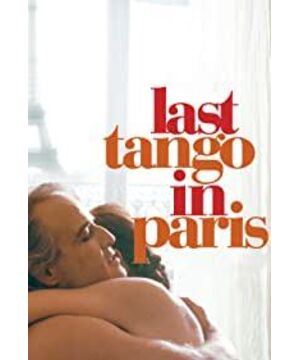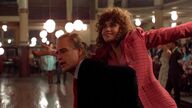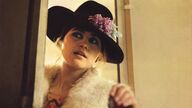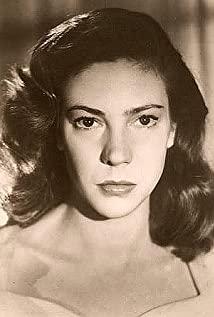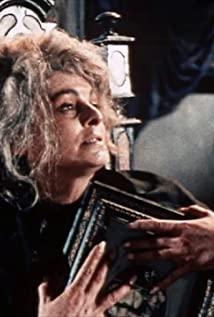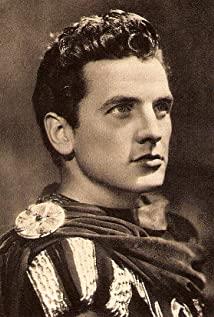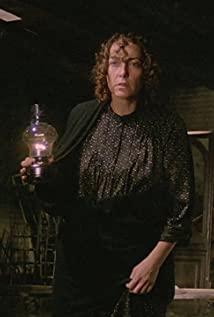Although the relationship between love and time has become a boring theme, and even though people are still repeating in and out of the cage of love, "Last Tango in Paris" still interprets this eternal human tragedy from another angle. There is no doubt that this is a pessimist movie, even if it is colorful from beginning to end-the red room, the red hall, the corpse surrounded by flowers, and the sheets stained with red blood, seem to be forever. The bathtub of endless blood is not clean.
At first, Paul, played by Marlon Brando, roared like a madman under the bridge, and his voice was overwhelmed by the train. Then, he curled up in his brown coat in despair, as if a little faint sound could torture him to death. , And Jeanna just walked in front of him happily, and they met again and again until he got the key to the rental apartment one step earlier than her.
Perhaps Paul just wanted to find a refuge where he could sit in a comfortable chair and leave the world that imprisoned him temporarily, as he said, to spend the rest of his life alone here. The doorman broke his plan out of greedy mischief: Jeanna's bribe made her hand over the spare key to the room, and the two finally met in the dilapidated apartment. There are only fragmented mirrors, dead potted plants, old furniture, and suffocating bathrooms. Perhaps the only thing left by the former homeowners is the red sexual desire in the room full of walls.
For a girl like Jeanna who has just entered the age of a woman, Paul, who is nearly middle-aged, is mysterious and full of masculine charm and power, just the opposite of her thin and talkative young boyfriend Tom, let alone In her memory, the role played by "father" is so subtle (Paul took a bath for Jeanna like a father, calling himself daddy in the ballroom and letting Jeanna drink the glass of wine is also very meaningful). For Paul, such a young woman is exactly their kind of middle class in suits and ties that are readily available in high-end ballrooms. Desire is ignited, and its wild and rude, almost back to basic animal hormones are released, just as they mimic the sounds of animals in place of each other's names when they have sex.
Paul and Tom are exactly two extremes. The former is a middle-aged man who is frustrated and cold like a child. His vicissitudes of life are desperate. The childhood memories of his parents' alcoholism, prostitution, and violence made him irritable, sensitive, lacking trust, and facing his wife. He was helpless and blindly vented his pain. When he came to his wife’s lover’s room, I even thought he would explode and retaliate, but he didn’t. He looked at the wallpaper that his wife had torn up and lowered his head silently, and only poured a bit of bitterness on the bed. Body of his wife.
Because of this, Paul brutally resisted the naive let Na invade his world and life, refused to talk and refused to listen. Memories are dangerous for him, even a small vocabulary will bring him back into the world he struggled to escape. He usually comes to Paris to rebuild his life in exile, but once again loses his safe haven. The Parisian drunk fans did not change the roughness of his rural American family. He used this roughness to draw a line from the life in Paris. He used rough language to resist the illusory life in front of him, and this kind of vulgarity is the best expression. It's nothing more than sex and violence. The biggest piece of furniture in the apartment is the bed, which is also the place where they live most often. The other place is the sofa, where Paul unguarded and cried secretly. When telling his story to Jeanna once, he curled up on the sofa and sobbed with the little lampshade, as if it had a similar fate to him, abandoned and indecisive.
And Jeanna’s boyfriend Tom is just the opposite of Paul—he is a mature boy who is innocent and optimistic. He is willing to listen to and explore Jeanna’s story, and even make their love story into a movie. He is immersed in it. In the world of her own drama, even extreme narcissism, she dramatizes everything about Jeanna, making gestures during quarrels, and even proposing marriage in the process of filming. His role tests Jeanna's patience, prompting Jeanna to dig deeper (perhaps unbearable) of herself.
If the story is still tedious and tedious until this point, then the last few scenes are simply amazing.
Tom proposes to Jeanne, she faces a choice for the first time. Marriage means that the irresponsible lust between her and Paul ends, and it means that she will lead a tedious daily life of "a man and a woman go home and take off their work clothes and start having sex." In the process of trying on the wedding dress, she rushed home in the rain and expressed her love to Paul. The latter was surprised, but only vulgarly tested her and taught her a "lesson". What’s interesting is that both Tom’s proposal and Jeanna’s confession appeared meaningful props: Tom put on Jeanna, a lifebuoy that could not float; and Jeanna found one on Paul’s bed. dead mouse.
Paul came to his wife’s pale body surrounded by flowers and confessed, crying like a child; he chased a man who had left his lover and taught him a lesson; he moved the furniture in the apartment, determined to make the real Presented himself in front of Jeanna. At this time, Jeanna, who mistakenly thought that Paul had left without saying goodbye, panicked and chose Tom, whom she had abandoned before. Paul was right. She was totally unable to be alone by herself. He generally identified loneliness and pain as companions, and the last thing he should have is the "hope" in Pandora's box. The naive game full of eroticism and catharsis between Jeanna and Paul, of course, cannot be shared with Tom, because the latter, in addition to trying hard to figure out how to dramatize all their future lives into a movie, is accusing her of not Like an adult, ironically, he finally gave her a tolerant hug.
When Jeanna was ready to revive her life, she and Paul once again met under the bridge. The train galloped past, and what appeared to Jeanne was a mature man in a suit and leather suit with the image of a middle class. He took her to the high-end ballroom and couldn't wait to confess his career and life to her. When his mysterious veil was torn apart, all of Jeanna's illusions about him began to shatter. His vulgar nature disgusted her, and his boring real life made her disgusting. In the tall hall, a group of such middle-class elites danced along with the tango. They left after a big uproar, and Jeanna desperately tried to escape Paul's chase, and finally fled to her own home. Paul chased her, and she asked for help like a madman in the elevator, as if Paul—the strange man who had made her have romantic fantasies—will swallow her alive.
In her home, Paul jokingly put on her father's hat. The masculine charm he thought was lost in Jeanna's eyes. The moment she said her name, she killed Paul with the pistol left by her father. Paul staggered to the window and glanced at the city one last time-there are many stories here, such as the mysterious woman who refused to turn off the faucet when cleaning his wife's suicide room, and the woman who went out to vent his sexual desire because his wife had snake skin. Men, there are still many unanswered puzzles, such as the reason why his wife committed suicide—but everything has nothing to do with him. He is just the one who curled up in his mother and muttered to his mother but never got the mother. The baby of love has died without being born completely.
In fact, in the final tango, the answer was already obvious. Bertolucci ended the scene with a few beautiful compositions (they ran out of the ballroom and then ran downstairs, the symmetrical composition contrasted the unequal relationship between them, the silent promenade was just like theirs Under the bridge when they met), Paul lives a middle-class life, but he despises his class. He takes off his pants and insults their so-called elegance. His usual vulgarity is his self-defense tool, and his mistake may lie in He always thinks that the end means the possibility of the beginning, but maybe on the way of love, Jeanna is still experimenting and searching, but he himself is almost dead.
View more about Last Tango in Paris reviews


